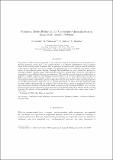Nonlinear Model Reduction for Uncertainty Quantification in Large-Scale Inverse Problems
Author(s)
Galbally, David; Fidkowski, Krzysztof; Willcox, Karen E.; Ghattas, O.
Downloadgfwg.pdf (709.9Kb)
OPEN_ACCESS_POLICY
Open Access Policy
Creative Commons Attribution-Noncommercial-Share Alike
Terms of use
Metadata
Show full item recordAbstract
We present a model reduction approach to the solution of large-scale statistical inverse problems in a Bayesian inference setting. A key to the model reduction is an efficient representation of the non-linear terms in the reduced model. To achieve this, we present a formulation that employs masked projection of the discrete equations; that is, we compute an approximation of the non-linear term using a select subset of interpolation points. Further, through this formulation we show similarities among the existing techniques of gappy proper orthogonal decomposition, missing point estimation, and empirical interpolation via coefficient-function approximation. The resulting model reduction methodology is applied to a highly non-linear combustion problem governed by an advection–diffusion-reaction partial differential equation (PDE). Our reduced model is used as a surrogate for a finite element discretization of the non-linear PDE within the Markov chain Monte Carlo sampling employed by the Bayesian inference approach. In two spatial dimensions, we show that this approach yields accurate results while reducing the computational cost by several orders of magnitude. For the full three-dimensional problem, a forward solve using a reduced model that has high fidelity over the input parameter space is more than two million times faster than the full-order finite element model, making tractable the solution of the statistical inverse problem that would otherwise require many years of CPU time.
Date issued
2009-09Department
Massachusetts Institute of Technology. Department of Aeronautics and AstronauticsJournal
International Journal for Numerical Methods in Engineering
Publisher
John Wiley & Sons, Inc.
Citation
Galbally, D., Fidkowski, K., Willcox, K. and Ghattas, O. (2010), Non-linear model reduction for uncertainty quantification in large-scale inverse problems. International Journal for Numerical Methods in Engineering, 81: 1581–1608. doi: 10.1002/nme.2746
Version: Author's final manuscript
ISSN
1097-0207